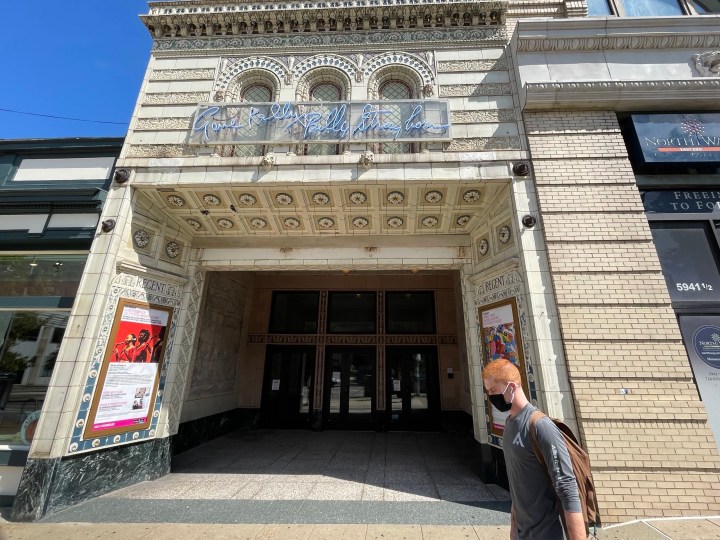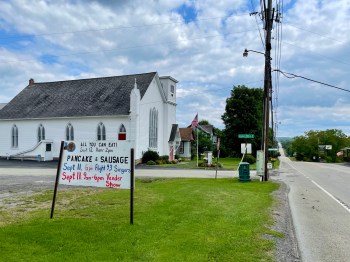
Could the Steel City become a silicon city? A look at a post 9/11 Pennsylvania
Could the Steel City become a silicon city? A look at a post 9/11 Pennsylvania

This weekend is the 20th anniversary of Sept. 11. Much has been said of the resilience and rebirth of downtown New York in the aftermath of the World Trade Center attacks. And what of Pennsylvania? That’s where Flight 93 crashed in a field in Shanksville, after passengers fought back against the hijackers on the plane.
Marketplace’s Nova Safo is in the state this week to answer that question. He joined Marketplace Morning Report’s David Brancaccio from Pittsburgh. Below is an edited transcript of their conversation.
Nova Safo: Pittsburgh is our first stop. It is the nearest major city to Shanksville.
And, it is at the heart of western Pennsylvania’s regional economy. That used to mean steel and coal. Those industries have shrunk.
One person tracking that change is Christopher Briem. He’s an economist with the University of Pittsburgh.
Christopher Briem: Here in Pittsburgh, heavy industry was very much tied to the rivers, they really needed that real estate, it needed that access. And so the the job centers of Pittsburgh, the region, stretched far out from the city center from downtown. And that’s really much changed, in that, certainly the last few decades, the job growth, it’s coming from ‘eds and meds’ — education, health care, financial services, technology, as it were — these are all things much more concentrated here in the city.”
Safo: And Briem says that’s meant rural areas outside of the city, where once there were steel jobs – have not benefited from the economic transformation.
David Brancaccio: That term he used — eds and meds — implying services over manufacturing as the source of jobs there?
Safo: Education and health services are the biggest sources of jobs here in Pittsburgh.
The city has made a concerted effort to diversify its economy. It’s courting tech as well.
One of the challenges the city has faced is that many tech companies are moving into areas that have struggled with the legacy of redlining.
Briem led me on a little tour of a neighborhood called East Liberty, that for decades was economically depressed. Now there’s redevelopment all around.
Briem: This was … very much an African-American neighborhood. It is now with the 2020 census, not even majority African-American, it’s about 40%.
Safo: And what is driving that change?
Briem: So, there’s a lot going on … but really new firms there are a lot of the technology firms that are here in the city are here in the East End. And folks who want to live close to that are probably creating demand for this housing that has never been there before.
Safo: In other words, gentrification.
There’s a tech accelerator in that same neighborhood, where they’re thinking about how to bring in diverse entrepreneurs to counteract some of that.
Listen to more of Marketplace reporter Nova Safo’s reporting on the tech industry in Pittsburgh, Pennsylvania.
Within the tech industry, Pittsburgh is paying a lot of attention to autonomous vehicles and robotics. The idea here is use regional manufacturing and logistics strength for new economy businesses.
I visited AlphaLab. Its managing director is Jim Jen. He walked me through part of the building where entrepreneurs can tinker with prototypes.
Safo: It’s a very cavernous space.
Jen: Yeah, it’s a cavernous space … we have a machine shop here with tools and equipment for the entrepreneurs here to do light prototyping.
Safo: What kind of things, what kind of prototypes are we talking about, what are they generally building?
Jen: For example, one company … has been developing a material that is got the properties of rubber, but is also thermal conductive.
Safo: And before you ask, David, you apparently could use that to make lighter laptops, for instance.
Brancaccio: So, start-up activity in Pittsburgh. But put it in perspective for us, compared to places like Seattle or Silicon Valley?
Safo: There’s a difference in scale. Startups in Pittsburgh last year raised just under a billion dollars in early-stage funding. That’s just a small fraction of the overall tech industry. But the tech companies that are in Pittsburgh are having an impact – a lot of new development around town. Repurposing old manufacturing facilities.
That’s also meant: gentrification. Here’s Jim Jen again.
Jen: All of us that are building an ecosystem, really want to make sure that we are making it as inclusive and to not have the disruptive effects of increasing, creating greater inequality.
Safo: Gentrification is an issue where you’re located here.
Jen: Yes, it is. And so it is an issue, that we are, are grappling with, and, and are focusing on.
Safo: Jen told me they’re making sure they invest in startups with diverse leadership, for instance, to counteract some of that gentrification.
A lot of those startups get gobbled up by bigger firms. So hopefully there’s a pipeline of diverse talent into the tech industry as a whole.
Correction (Sept. 8, 2021): Jim Jen’s name was misspelled in an earlier version of this story. The text has been corrected.
There’s a lot happening in the world. Through it all, Marketplace is here for you.
You rely on Marketplace to break down the world’s events and tell you how it affects you in a fact-based, approachable way. We rely on your financial support to keep making that possible.
Your donation today powers the independent journalism that you rely on. For just $5/month, you can help sustain Marketplace so we can keep reporting on the things that matter to you.





















